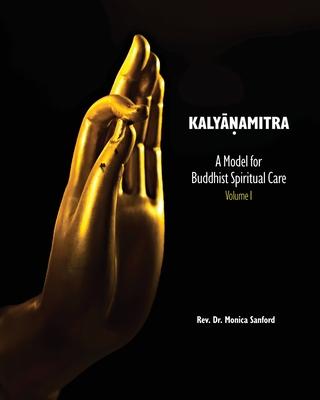Kalyanamitra: A Model for Buddhist Spiritual Care is the book Buddhist chaplains have been waiting for. Rev. Dr. Monica Sanford presents research and analysis into the professional practice of Buddhist spiritual care based on the work of actual chaplains in hospitals and hospices, the military, prisons, and colleges. Just like their Christian counterparts, Buddhist chaplains provide spiritual care to distressed people from a variety of religious backgrounds, including people who aren't religious at all, but still need a caring companion in times of crisis. Kalyanamitra is one of less than a dozen books about this young, but growing profession, and the first to present a comprehensive theory for Buddhist spiritual care.
Chapter 1 describes what a Buddhist chaplain is, including definitions of terms and vivid stories that paint the picture of the work they do. A personal narrative from Rev. Dr. Sanford outlines the process of personal and spiritual formation Buddhists experience as they learn to both be and do the work of a chaplain. The chapter concludes with an introduction to the practice of reflection, sometimes called "theological reflection," an essential skill for putting one's spiritual and religious knowledge to work in an interreligious and intercultural world.
Chapter 2 describes what Buddhist chaplains do, starting with a careful summary of the sources of Dharma that guide a Buddhist chaplain's practice. Rev. Dr. Sanford reviews texts from Theravada, Mahayana, and Vajrayana sources - both ancient and modern - in a cogent and accessible way, ensuring that this work is valuable to Buddhists of any background. The chapter also describes the role of traditional teachers and sanghas in the support and formation of Buddhist chaplains. It furthers the training in reflection begun in chapter 1, before diving into a careful description of each of the contexts in which Buddhist chaplains work - healthcare, the military, prisons, and colleges and universities. It concludes with an analysis, based on data derived from Rev. Dr. Sanford's unique study of chaplains in the field, of how to determine the effectiveness of spiritual care provided to those in need.
Now that readers have a good sense of who Buddhist chaplains are and what they do, Chapter 3 presents the first comprehensive theory of Buddhist chaplaincy - the Three Prajās Framework for Spiritual Care. Rev. Dr. Sanford presents the Framework both evocatively, in the form of a sutta or scripture, and through the data she painstakingly collected from thirteen practicing Buddhist chaplains and analyzed over many months. She clearly breaks down the Framework into four developmental stages that describe the lifelong spiritual formation of Buddhist chaplains. Then she further breaks down each stage into a three-part heuristic that can guide the professional work of chaplains in any setting. The final stage - kalyanamitra or spiritual friendship - serves as a model for modern Buddhist spiritual care.
Chapter 4 presents the kalyanamitra model in full, including detailed review of Theravada, Mahayana, and Vajrayana literature on the topic. Rev. Dr. Sanford presents the first model for Buddhist chaplaincy suitable for Buddhists from any tradition or culture. She is also forthright about the implications, applications, and limitations of this model and her research as a whole. The final reflection invites readers to join in the work of defining the profession of Buddhist chaplaincy as an ongoing project for the benefit of all.
